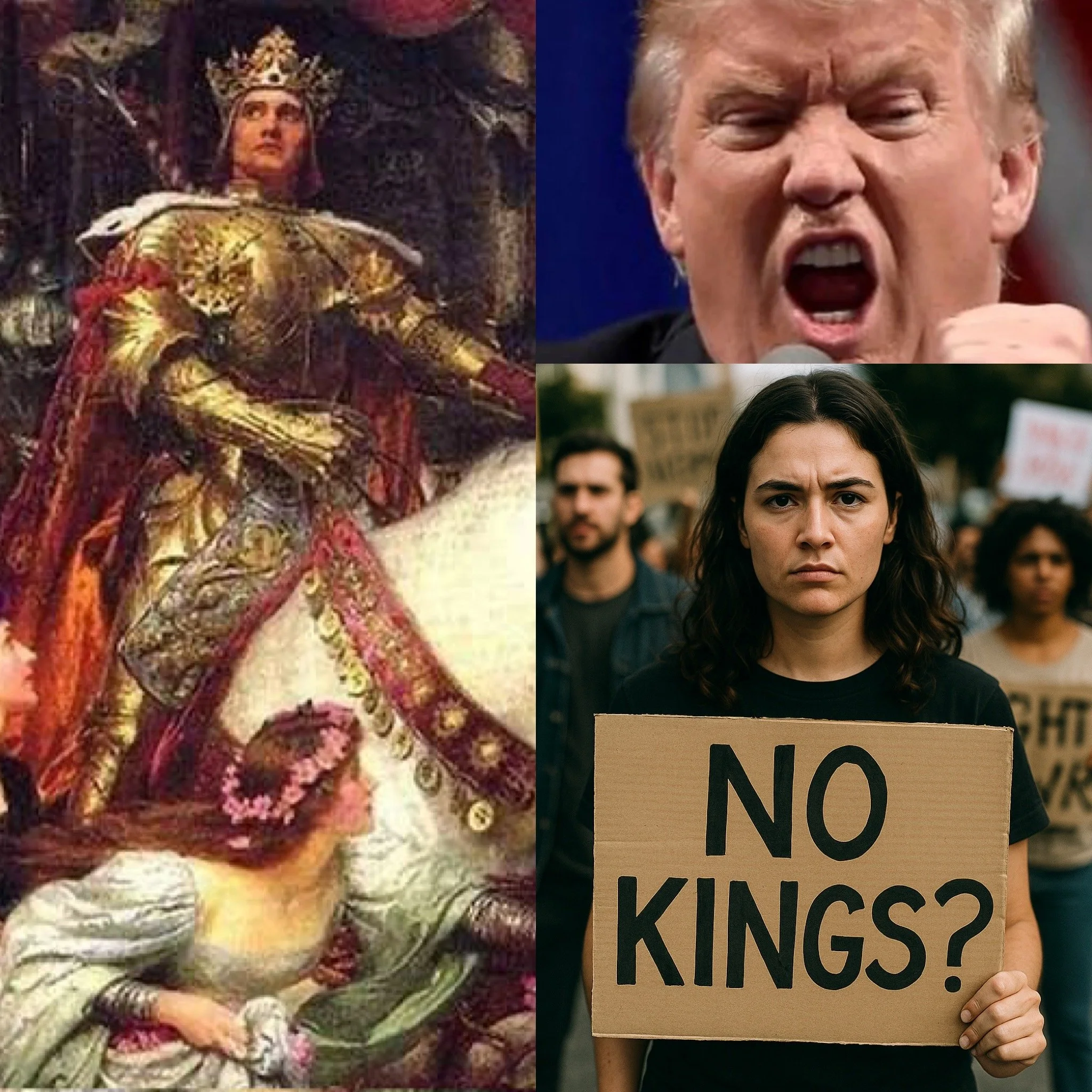NO KINGS? Why We Need Healthy Masculine Leadership NOW
A Culture Starved for Mature Masculine Leadership
Whether you’re Team Trump, Team Democrat, or Team G.T.F.O., we can likely agree: the world wins when men lead from integrated, transparent, competent positions of authentic power.
On June 14, 2025, “No Kings” protests swept the nation, aimed at rejecting what many see as the current administration’s abject tyranny. No issues there—I fully support the right to protest peacefully and am not here to critique or endorse any administration.
But I am here to challenge the name.
“No Kings” isn’t just a catchy slogan; it’s a revealing choice, one that points to a deeper cultural confusion around masculinity and leadership.
When asked about the name choice, the organizers of the protests responded with the following clarification: “We reject authoritarianism. We reject fear. We reject tyrants.” Great. But “No Tyrants” isn’t the title they chose:
They chose “No Kings”.
What’s in a name? Far more than meets the eye. And as someone who works with men, I can’t stand by while the King archetype is carelessly equated with tyranny. It is far too important.
Using “King” to mean “tyrant” isn’t a harmless misnomer. It dangerously blurs the line between tyranny and true masculine leadership, sowing confusion in a culture already fragmented in its understanding of men—and especially men in power.
This distinction matters. Case-in-point, the weekend before these protests, I co-led a men’s initiation here in Austin, Texas—32 men from around the world stepping from boyhood into manhood on the Masculine path we call “The King’s Code.”
Talk about irony.
It is clear to me that there is a pressing need to collectively clarify the difference between Tyrant and King. Not to take political sides, but to reawaken the King in men and restore the belief in the existence of healthy masculine leadership in a culture clearly starving for it.
In “The King’s Code”, we draw heavily from Jungian and mythopoetic lineages, including Robert Moore and Douglas Gillette’s seminal text King, Warrior, Magician, Lover. Here, mature masculinity lives in the archetypal King within every man who commits to this path—a path made by walking.
The healthy King brings order to chaos, unity to society, and stability in service of the whole.
He is the central, integrating force in the masculine psyche, embodying calm authority, clear boundaries, and a clarifying vision.
He leads from service, eyes on the common good and the welfare of the people, grounded in devotion to something greater than himself.
The Tyrant, meanwhile, is everything the King is not:
Where the King blesses, the Tyrant extracts.
Where the King stabilizes, the Tyrant controls by force.
Where the King serves the whole, the Tyrant seeks self-centered power.
Where the King leads from grounded vision, the Tyrant leads from wounding and fear.
This “No Kings” moment feels like a Freudian slip of the collective psyche. We are hurting from the absence of healthy masculinity. In our longing to find it—or elect it—we’ve somehow ended up pitted against each other, barricaded across ideological lines instead of united in our shared suffering in absentia of true Kings.
Generations of fatherlessness, abuses of authority, and the “crisis of masculinity” has led to a culture that labels men as the problem, masculinity as toxic, and any strong masculine leadership as tyranny. We’ve used “Patriarchy” to mean abusive male leadership, forgetting the distinction between tyranny and healthy authority.
Don’t get me wrong here. It is VERY understandable how we got here. We’ve seen real tyranny on unimaginable scales. The history of the 20th century alone proves this beyond any shadow of a doubt. But I truly believe we are ready for something new.
To that end, when I first saw the slogan “No Kings” plastered on protest signs, something in me actually spoke it aloud as a question:
“No Kings?”
To me, it felt like a cry of longing, both from my own soul and from a citizenry starved for integrated, mature masculine leadership.
Seen from this angle, “No Kings” can become an invitation–a call up for men instead of yet another gross generalization of masculinity in the negative.
“Where are the Kings?”
Where indeed?
Where are the men who:
Lead from depth, clarity, and service?
Hold power without abuse?
Hunt for something big enough to make a difference and greater than themselves beyond their own individual enrichment?
Stand grounded in values, knowing what they want, and stepping forward in responsibility for the realm—not just themselves?
Maybe you feel Trump is that man. Maybe you see him as the opposite. Regardless of our politics, the King archetype is needed now more than ever—not as a ruler to dominate us, but as a sovereign man whose leadership turns chaos into kingdom, without demonizing the Feminine, or “othering” opposing views or perspectives.
To those chanting “No Kings,” perhaps there may be something deeper to consider. So I invite you to ask:
No Kings? Or the Kings we desperately need?
Where are the mature men our culture is begging for?
We need to recognize the goodness in men now more than ever.
Men: you are needed. You have a place here. You have a mission living within you that is worth fighting for.
Male leadership can truly stand in integrity, and stand for something so beautiful and brilliant that it blows this whole thing open and we all weep with revelation and wonder to stand and gaze upon the glory and goodness of a true King.
Can a modern man truly rise to become the King his soul, his woman, and his world are calling for?
I believe the answer is Yes.
I believe in the inevitable.
I believe in the Return of the King.
If you enjoyed this piece and want a deeper dive, check out EPISODE 31 of “The (Re)Masculation Podcast” with my dear brother, Oak Mountain, where we
